At a CEPA briefing on Friday, 7 February 2025, panel chair Edward Lucas steered the conversation towards the challenges of enforcing a ceasefire in Ukraine.
The discussion quickly shifted to the broader issue of military capacity amid mounting pressures on Western forces, with former US National Security Advisor H.R. McMaster offering a stark assessment of the state of British Army capabilities to the journalists present, myself included.
To add context to his views, it is useful to recall the background of H.R. McMaster. Born on 24 July 1962 in Philadelphia, McMaster hails from a military family and graduated from the United States Military Academy at West Point in 1984. During the Gulf War, then-Captain McMaster commanded Eagle Troop in the Battle of 73 Easting, where his decisive leadership resulted in the destruction of 28 Iraqi tanks in a mere 23 minutes—an achievement that earned him the Silver Star and established his reputation as a formidable tactician. This performance is still widely studied in military circles as a model of effective combat leadership.
After the Gulf War, McMaster furthered his education by earning a PhD in American history from the University of North Carolina at Chapel Hill. His subsequent work, notably the bestselling book Dereliction of Duty, critiqued past military leadership during the Vietnam War and reshaped discussions on strategic command. He continued to command key units, including the 1st Squadron, 4th Cavalry Regiment in Germany and the 3rd Armored Cavalry Regiment in Iraq, where his innovative counterinsurgency tactics proved decisive.
In February 2017, McMaster was appointed the 25th United States National Security Advisor under President Donald Trump—a role in which he emphasised strength and burden sharing among allies. Even after resigning in April 2018, he has remained influential as a lecturer and strategic adviser, lending considerable weight to his insights at forums such as the CEPA briefing.
Commenting on the capacity of European armed forces at the briefing, McMaster stated emphatically:
“Look at the British Army right now. I mean, it makes me want to cry, almost.â€
He explained that while the British Army remains professional and capable, it now lacks the necessary capacity to sustain large-scale operations. He elaborated that this shortfall is not unique to the UK but is symptomatic of a broader issue affecting Western militaries—a consequence of post-Cold War defence strategies.
“We’ve been on this model for a long time that we could achieve security by investing more and more money in fewer and fewer exquisite systems. We traded off the size of the force for capabilities, but what we’re seeing in Ukraine is a return to the importance of force size. The capacity of the force matters.â€
He warned that if the multinational force intended to enforce a ceasefire in Ukraine is not credible, it risks becoming “a really tempting target for Putin,†potentially undermining Western credibility. McMaster underscored that any such force must not only counter conventional military threats but also be resilient against hybrid warfare and non-traditional forms of aggression.
“Any force that comes must be capable of defeating all forms of Russian aggression—conventional, hybrid, and beyond. Without reflecting the military realities on the ground, there’s never been a favourable political outcome to a war.â€
These remarks come at a time when European leaders, including those in Britain, are grappling with significant capacity challenges and contemplating major reforms to modernise their armed forces. McMaster’s pointed observation about the British Army encapsulated the urgency of reassessing defence capabilities in light of the current geopolitical landscape.
As the briefing concluded, the panel’s discussion on military capacity—bolstered by McMaster’s extensive military background and candid comments—highlighted a critical need for renewed investment and strategic planning among Western allies to ensure a credible deterrent and sustainable peace in Ukraine.
To add some balance here, I asked a currently serving senior officer about the remarks. Wishing to remain unnamed, he told me “The British Army is currently meeting every commitment we’re asked to”.



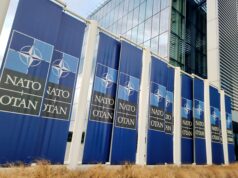
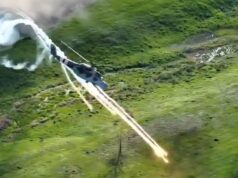
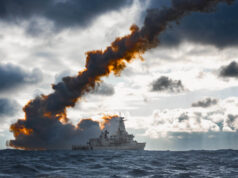
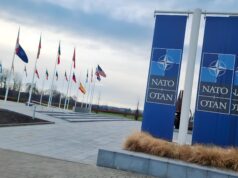

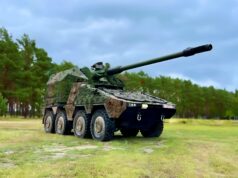
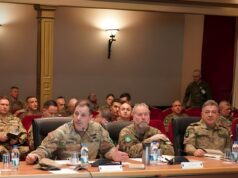
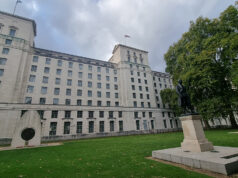
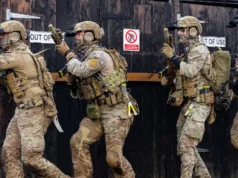

While we are meeting every commitment at the moment will we be able to meet the ultimate full scale commitment required for a general war?
Very doubtful for any extended period of time!
The simple answer, sadly, is no. Also we are only meeting existing commitments becayse they do not need forces at the same time. Rwenty years of shambolic politics have made a nonsense of our armed forces and I can’t see things getting any better.
Jackie. Good points. The fact that our small army can meet small scale, non-kinetic commitments in peacetime is hardly surprising. This anonymous officer should have said something about its ability to meet future more demanding operations as that what McMasters was talking about.
Join the club.
Don’t push in line, there’s a queue for crying here
Yep tell us something we don’t all ready know…
Isn’t the actual problem that Army are after perfect systems that get in the way of good systems.
Perfect systems take forever to develop and are very risk then out of date when ready to be introduced and so cut.
There is a lot to be said for moving fast.
For example you end up deploying platforms using state of the art 1990’s electronics that are already hard to support as it is obsolete.
You wouldn’t dream of having a 1990’s computer at home for anything useful.
Slow development cycles are a real issue. As you have to go round again to remove the obsolescence before prototype serials are produced.
Wow, retired General thinks Army needs more money, quick call the Daily Mail.
It often amazes me how apparent professionals can look at the war in Ukraine and draw comparisons with NATO forces. Like they seem to discount the fact that air forces exist and the army’s role in major conflict is of tertiary importance. They watch two third world army’s slogging it out with artillery and tell everyone how we can’t do that so we must be inferior. Iraq and Iran spent 8 years doing the same and NATO armed forces still cut through the Iraqi army in hours. We conquered the 4th largest army in the world and only used 60,000 artillery shells.
Very little of what you say is accurate. RUSMIL have extensive and truly integrated air defence systems, this means the air battle is likely to result in Russian air superiority behind the blue line of FLOT making our ground units critically important, and simultaneously placing them at considerable risk. HR McMaster is entirely correct when it comes to peer warfare – we (UK) are simply not capable of sustaining any action, in my opinion because we’ve been hollowed out since the mid 1990s and shaped for COIN operations.
Also, look up your definitions of first, second and third world.
Is your name Alan or Artificial Intelligence?
The USAF spent quite a lot of the gulf war, and a significant chunk of their training since, on SEAD and DEAD missions. I’d argue that the ELINT-aircraft-missile kill chain for missiles like AARGM is more refined and robust than the detection and firing systems in stuff like S400.
Their IFF systems are so bad they can’t even turn the radar on with friendly fighters around, and they have had even less practice against a NATO style combined arms approach.
I’m not saying that any aspect of our defence is infallible, but it isn’t as hopeless as you make out.
The issue is not so much can we defeat a Russian offensive, because the obvious answer is yes NATO could. But peers wars are not about the short war or one campaign. They are all about who wins the long painful slog. A peer existential war is not a competitive Martial arts scored bout , it’s a no rules fight between two heavy weight bare knuckle boxers hitting each other until one either gives up through collapse of political will or falter from strategic exhaustion.
The west has show that although it’s still the master of the short campaign, it has not shown evidence that it has the political will or the depth of resource for the long drawn out existential peer conflict. Infact it’s showing the opposite to its enemies and china and Russia both know this.
Against Russia? Given the EU and US’s GDP’s and Military Industrial Complexes, as well as population differences? Yeah I think the West wins that long war, handily.
America is very good at getting bored and going home when fighting Wars of choice against an enemy that can’t really harm them (as large imperial powers have often been prone too, see Britain in Afghan (no not that time, the other times) and America, or Rome in Germany). But in peer conflict against a major rival where the consequences of loosing are considerably greater than having to feel bad on a Twitter Argument? I think the west would stick that kind of thing out.
Is their SHORAD donkey based?
Quite agree Jim, as mentioned before, too much is said about our military in a negative way. When push comes to shove, the UK military pulls it off. Yes we have a small military, however, it’s one of the best in the world where many aspire to be. After all do we have a military so big that many would be just not doing much and watering down the skills set and professionalism.
Cheers
George
I would feel more confident if we had a well trained reserve force that we could call upon like Finland. Not sure that Fortnite and idolising Andrew Tate is probably the best preparation for that.
As ever: There is no point maintaining a reserve in a Western European nation that has no mobility. Finland has a very small regular army, a decent sized (for it’s population) mobile Mechanised Reserve, consisting of a few brigades, and a large territorial reserve that can stand in place in the towns and forests they live in.
The further from the Russian border you get, the more that calculus shifts to needing a Mechanised Army, as territorial reserves will be nowhere near the fighting. The British Army already has far more Light Infantry Reserves than it has any use for besides BCR’s.
Very little of what he says is ever accurate!
Seriously. Have you seen the Russian Armys performance in Ukraine? Also. Zero air superiority. And they have lost a big chunk of warships to a nation that doesn’t really have a Navy.
Morning Jim, Unfortunately he is absolutely correct as the force levels required for Gulf Wars no longer exist, we cannot deploy our excellent forces in any meaningful mass in more than one place. And the bit that gets me is “Any force that comes, must be capable of defeating all forms of Russian aggressionâ€, anything less is not a deterrent. It’s pretty obvious but the implication is it involves NATO having to deploy a full on mass “all arms force†complete with long term support, supply’s and accommodation on the Ukrainian / Russian DMZ.
So the bulk of the British Army would be deployed at the southern end of an 830 mile border and will be tied there (just like the US in Korea), which is a nightmare as Putins next target is supposedly the Baltic states, which is where we are supposed to be able to deploy in wartime.
Who’s Trump working for ?
I think it’s time to join him with the tissues. 😢
Well worryingly to add to his own dubious connections to Russia, Musk has dubious links everywhere especially with China, one of the Doge chipmunks had/has Russian websites and one of Musks prime appointees has just been revealed to have received $25,000 for appearing on Russian propaganda programmes. Oh and then there’s Tucker Carlson roaming around the White House well known for his insightful propaganda pieces about how wonderful Russian civilisation is. Indeed I’m sure a combination of Russia and China is the model for Making America Great Again either way once they have control of everyone’s data controlled by ai if Musk gets his way like those Countries the people will be mere cannon fodder. Actually the future reminds me of the final series of Westworld and I’m not usually cynical enough in my predictions.
None of this should be any surprise. A lot of people were shown the door all the way back to Options for Change for saying out loud what was patently obvious. And how many reviews have we had since then?
I mean the current procurements of Boxer and Ajax now seem on track and we may well end up with 2 excellent vehicles.
It’s a massive issue that we have completely skipped a whole generation of armoured vehicles. The Warrior is 40 years old and the Bulldog— despite some upgrades 20 years ago— is over 60.
So it’s a race against time to get the new vehicles into service before the former become completely obsolete.
We need to get much better at buying off the shelf, spiral development and in service upgrades.
Simple fact is that we have gone too far in reducing the size of the army. Realistically the army would be totally unable to provide a reasonable size force in Germany, the Baltic/Arctic, home protection in a war situation and also protect our overseas possessions… we physically don’t have enough to cover all the bases. If it comes to war, we need to. If we want to deter the likes of Russia we need to show Russia we can. We can’t rely on America – under Trump they are worse than China – and do really need to make ourselves as self sufficient as possible. Will it happen? Course not.
We is the whole of Europe though.
There’s no scenario in 2025 where we fight Russia alone.
And certainly not without air supremacy.
Sam the problem is not the scenario where the whole of NATO fights Russia alone and stops any attack on NATO because the mismatch is such that Russia would have little chance of winning.
The two key questions are
1) how do we make Russia, a nation the size of a continent capitulate, instead of dragging into a long war which NATO may not have the political will to keep fighting.
2) There is a very good chance the next war will not be a Russia NATO war, but a wider world war..why would our enemies all wait for the west to win history in detail..we go to war with Russia, it’s very likely china will make its move in the western pacific then North Korea make its move on South Korea..Iran taking its opportunity for regional hegemony..that’s how world war 2 developed…it would be NATO and regional allies fighting china, North Korea, Russia, Russias 6-7 allied nations, wars and conflicts in Africa for resources..even possibly contagions into South America as china flexed its influence. How the hell do we win that war..how do we reduce half the world to strategic exhaustion or political collapse without suffering it ourselves.
These are core questions we have to consider.
Keep funding and supplying Ukraine.
Poison all the donkeys, so Russia runs out of re-supply.
Diplomatically isolate Russia from China.
Hmmm – I wouldn’t be so sure about ‘the whole of Europe ‘. If – and honestly I hope it never happens – there is a punch up with Russian forces, I wonder just how many Europe governments will actually approve of their forces’ involvement – especially when body bags start coming home. The UK, France, Poland, the Baltic states? – I would say yes but it will be wildly unpopular domestically. Spain, Italy, Portugal, etc? – no way. They will not get involved. Europe yes but the whole of Europe? – not a chance.
David, the ENATO nations should all fight if Article 5 is declared. They did last time and that was not even to save their own country or Continent.
And those willing will easily be enough.
When Body Bags come home from defensive Wars that has always had a tendency to stiffen resolve rather than weaken it. Out of Area Wars of choice always have a bit of a different dynamic to great power struggles that have the potential to result in your country being occupied or annexed if you loose.
Army has been badly led for years. Look at the nonsense in the dessert, did not go well.
McMasters criticism of the size of the British Army is right- it is small with only limited reserves of personnel and weapons. But there is another question he should consider. What has the biggest defence budget in the world, the USA’s, actually achieved since WW2?
Uneasy stalemate in Korea
Defeat in Vietnam
Iraqi freedom that spawned ISIS
Failure in Afghanistan
Only Desert Storm was truly successful in its aims- the liberation of Kuwait.
The use of force only works properly if war aims are clearly defined and there is no better alternative. Having very large forces makes it more likely that a state will resort to their use when it might be wiser not to. Force size should be determined by clear definition of what is expected of it. Can the British Army defend the UK from conventional attack? Yes. Can it protect UK overseas territories? Yes. Can it play a major part in the defence of NATO allies? Not on the scale of the days of BAOR. But should it even try to? The real peace dividend has been the liberation of Eastern Europe and it’s joining western institutions. Russia now faces an alliance that even without the USA has a population and economy several times greater.
What Britain needs is the ability to scale up its forces in a crisis- bigger and better balanced reserves, rather than an increase in full time professionals.
And McMaster perhaps should recognize that it is largely the use of exquisite Western supplied PGMs that has allowed a much smaller weaker force to fight one of the worlds largest to a standstill.
That’s right Peter, as my reply to Jim. Many make fun of the UK military, and yes it’s small and could be larger. However to what degree should the size be? The UK when faced with a major conflict and defence of our interests normally pulls it off!
Cheers
George
I don’t think anyone is actually denying we don’t have professional soldiers well able to do their job!
Your point about always managing to “pull it off†is probably why we are in this state now,BUT there will be a point where we cannot manage to do so!
You forgot their superb invasion of Grenada ! Their only successful stand alone victory since WW2 was a tiny Commonwealth island that they neglected to tell us about ! Oh and the Iranian Hostage Rescue / Fiasco.
Peter. The US has, with its membership of NATO played a key part in ensuring that another world war did not break out and by its arms race under Reagan won the Cold War and caused the Warsaw Pact and the USSR to implode.
Despite its declining military strength the UK remains a global power. As well the British Army being able to defend the UK base and the BOTs we need to contribute strongly to NATO. More broadly our forces, especially the RN, supports allies in the Far East to oppose Chinese expansion and ensure freedom of navigation etc.
Our army is unable to sustain deployment of a regular brigade on an enduring operation, such as Op HERRICK and Op TELIC. If Republican terrorism once again happened in Northern Ireland, the BA would not be able to deploy a force anything like the strength of that on Op BANNER. In the event of warfighting our ‘armoured division’ would not be able to sustain itself for more than a few weeks or months.
We do need a larger regular army.
What you list is the very big problem the west faces..it’s forget what an existential war really is, it’s war to either complete strategic exhaustion or total loss of political will. What the west has shown is that it’s political will has a tendency to collapse with very little pressure, that is why Russia and especially china are eying up the west…if the U.S. cannot even stick to Afghanistan with less than 2000 people killed,how long will it fight when china goes all out and just keeps on going no matter the cost and the casualties mount into the tens even hundreds of thousands .
Quite agree Jim, as mentioned before, too much is said about our military in a negative way. When push comes to shove, the UK military pulls it off. Yes we have a small military, however, it’s one of the best in the world where many aspire to be. After all do we have a military so big that many would be just not doing much and watering down the skills set and professionalism.
Cheers
George
George, the concern expressed by the US officer is really about our army’s ability to do medium and large scale military operations, especially warfighting against a peer or near-peer oponent, and for more than a fortnight.
Russia are using donkeys and camels to re-supply ammunition.
The mistake would be to stop supporting Ukraine now even if USA do and take a crazy Trump plan for peace.
Dont give Putin a chance to re-arm or re-group.
Observation: Before 1916 the British armed forces were volunteers. That year saw the creation of the largest land force this United Kingdom ever fielded. It was even so, much less than those of France, the major combatant force on the Western front, and the Imperial German Armies by orders of magnitude. Prior to that conflict, the U.K. used expeditionary forces of much smaller size to achieve effects against largely native fighters with markedly inferior abilities technically; in many of these conflicts native forces recruited locally and British led achieved many of the outcomes. Since Blenheim in 1704 and all subsequently Continental wars, Great Britain and latterly the United Kingdom, fought as part of an Alliance. !791 was disaster since Great Britain had managed to alienate everyone; more isolated in fact than in 1940. The U.S.A had a tiny army in 1942 and has since maintained much larger forces to fight wars chiefly alone on other people’s lands. Today our former colonies maintain forces of their own; Canada was a notable though frequently ignored, component of the Allied effort through World War One & Two, as were the Australians, most overlooked in the successful campaign in New Guinea. A unique histrocally series of political catastrophes in Europe from the second half of the 19th century, unlikely to be repeated, led to a re-shaping of the world order that followed the Congress of Vienna 1815, through German agression against its neighbours. The end of Empire would have always led to a smaller army as commitments diminished and abilities of allies developed. Even so, there are different ways yo skina cat; the U.K. has fought (‘contained’) several ‘bush fire’ conflicts since 1945 in some contrast to the performance of the U.S.A.
My typing is draedfool.
Still not sure that history lesson really illuminates the overall state of our army presently. I also would not be quite so optimistic about potential lack of political and divisive ructions and new dangerous alignments in Europe. As for across the pond which pretty much dictates everything they probably at best have two years to prevent a developing coup engineered by Musk and co taking complete control with a demented President who is either to dumb to see what’s going on or thinks he is in effective control of it. I think there is a Newsweek cover coming out with Musk sitting at the Presidents desk while he and Tucker are presently parading around the Oval Office in oversized MAGA caps reminiscent of the spoof version of Darth Vaders helmet. Oh well at least the caps aren’t reversed yet, they leave that to the teenage mutant turtles with deeply suspect social media profiles who are acquiring all the Govt and voter data it needs to give front man Presidential candidates a victory akin to Putin.
Oh and if Reform get in I fear we will be about as Independent as Belarus is to Russia with Farage as Quisling… assuming Musk doesn’t prefer Lord Binface to be in charge. As Trump would say it’s a very beautiful future, a beautiful future the world has never seen before.
Not at all a great comparison. In 1914 the UK and it’s Empire was the richest nation in the world, with the greatest industrial capacity, and the effort of building up our Army to the point where it could fight against continental powers in a few short years cost so much that by 1918 Britain had gone from the World largest creditor (loaning more money than anyone else) to the worlds largest debtor (owing more money than anyone else).
The US had a tiny army in 1941, but it also had a MASSIVE arms industry that had been bankrolled throughout WWI and since 1938 by the Allies who where shovelling money at the US to build as much war material as possible (at a economic cost that resulted in the loss of the British Empire).
We neither have the industrial base advantages we had in 1916, nor the financial position, nor the Empire to barter away now. Be very careful trying to learn lessons from history when you are only looking at the very surface level facts.
These ‘surface levels facts’ are what most would call realities. Given a new name changes them not a jot. Read about the campaigns undertaken by the British army beginning in the 18th century up to the present day. The article discussed the British army not navy. If that history is brought in focus the story is markedly different. Thanks for taking the time to talk down to me.
Wow tetchy much? I think you missed a few things Barry. First of all I didn’t deny any of the reality of anything you said, I simply pointed out that taking those facts without understanding some of the background context will lead you to the wrong conclusions, which you seem to be doing.
Nobody said “It’s not a fact that the British Army was massively expanded between 1914 and 1918.” What was said was “Yes the British Army was expanded massively in WWI, but that was done with one of the best industrial bases in the world and involved bankrupting the richest nation in the world. And so the lessons from that time aren’t applicable to a second tier power with a limited industrial base and massive national debt.”
Secondly I did not mention the Navy, I was talking about industrial strategy and the Army, maybe stow the outrage and actually bother to read?
And finally, if you can’t take context being added to your post without feeling “spoken down too” that’s your problem not mine. I recommend examining the chip on your shoulder.
I think we all weep esp at the procrastination of yet another review to help avoid urgent decisions.
Spy, all new Governments do a Defence Review. Just insane that this one is taking so long. Many complained that it took HMG about 3 months to understand all that was happening in the economy and produce a Budget. Why is it going to take 9-12 months to do a Defence Review?
Yep it’s really not that difficult really as everything is a known factor.
“The British Army is currently meeting every commitment we’re asked toâ€. …so he agrees then ?
We in the west have forget a few realities with our obsession with exquisite capabilities and the short war, which along with an obsession with cost control has reduced the deterrent effect of our military. Our enemies on the other hand still read history and view war differently.
The west view of war:
1) “The end of history and the last man†this piece of writing profoundly impacted on the west and its view of future wars. Unfortunately it suffered from the same issue as all “political movements†only the people in it believed it or took any notice. But essentially the west sculpted the deterrent aspect of its military on the premises the the “liberal democracy†model had won and that all nations not following a model of liberal democracy would naturally over time become liberal democracies because it was superior in every way ( essentially the same sort of trap the Soviets fell into). Trouble is the other half of the world thing the whole idea of “liberal democracies†is not only weak, but a threat to their own systems and beliefs.
2) war and peace are completely separate..you are either at war and shooting kinetic effectors at people or your at peace.. this is mainly because since the end of the Cold War Western Europe, liberal democracies and the US have been isolated from war, yes we send our militaries off to fight, but we don’t really know war anymore. War to the west is telling its military to go and kill some people using a massive edge in capabilities to minimise loss of life in our military..essentially PAX Americanas 21c version of PAX Britannia’s gunboat diplomacy…. This is the character of the nations that uphold and live in a PAX…the problem with this is we live in a time when a PAX is breaking down and may even no long live in a PAX..and we are if we are not very lucky just about to get a profound understanding of war when you don’t live under a PAX.
3) The short war, for some bizarre reason after spending almost a century fighting very long wars to strategic or political exhaustion ( including the 45 year long Cold War) the west decided that wars are short sharp beheading campaigns..even after it then spends decades fighting wars in Afghanistan ( which it absolutely lost) and Iran ( which it really did not win) and then watching Ukraine and Russia fight for a decade (even with one of these nations have 10 times the power and mass of the other). This delusion of the short war came essentially because of a belief in point 1 and the lived reality of the west’s populace from point 2. Basically we assumed that if you chop the head off the body will automatically become a western democracy( which is utter BS and never happened in history) ..instead of growing a new head and fighting until complete destruction ( which always tends to happens) and our high capability western militaries are very very good at chopping off heads.
So this these points 1-3 are all well and good if you live in the middle of a PAX where you enemies actually acknowledge your overwhelming power and are deterred from an all out existential war. But are profoundly damaging if you’re not living in a PAX and your enemies decide they are going to fight an existential war to destruction.
So what do our enemies or even the rest of the world think.
1) Well they generally cannot abide Western hegemony and are in no way sold on the idea of Liberal democracies being the superior and natural form of government. Infact they actually see western liberal democracies as politically weak..and many of our enemies especially china believe that the key characteristics of winning any existential war is the Political domain..if your political system collapses, can no longer get the population to support a war or is unwilling to continue to suffer to prosecute a war..you will lose and this is infact true throughout human history, a huge number of wars are lost through political defeat..the latest example is Afghanistan and we have essentially seen the same thing happen in Syria..if a government is unwilling or the population is unwilling the war is lost.
2) war and peace are a continuation of the same process of conflict, essentially peace is the continuation of war by other means. China and Russia have continuously attacked the west since the early part of the last decade and they have been slowly upping these attacks..they use a combination of different political domain attacks..such as causing mistrust and misunderstanding across societies as well as dependency on supply chains..the west only really now understands war in the kinetic sense…which is bizarre considering is waged a 45 year long political war against the USSR and won…but it was so taken by the idea of the end of history I simply stopped fighting wars outside of the kinetic.
3) the long war..china essentially considers the idea of the short war to be almost delusional..Mao essentially said, the short war is a lovely idea but it’s not how you win. Almost all wars that matter ( existential wars) are always long drawn out grinds of suffering until one side either fails politically or suffers strategic exhaustion…even if you win the initial campaigns and think you have had a short war you are inevitably drawn into a long war you have to win.
So the west needs to really think about what it’s enemies are thinking and develop its deterrent forces to counter that thinking and essentially that means big armies, big navies, big airforces and then rubbing them into our enemies faces hard, while engaging in whatever nasty political warfare is needed..essentially what we did in the Cold War.
Hiya Jonathan, you make some very good points, if it wasn’t for nukes our political rivals, commies, nazis etc. would have overwhelmed us this century, you have pointed out quite a few Sun Tzu’i observations, not least being to subdue the enemy without fighting is the acme of skill.
For me, I think the Einstein quote says it all.
I don’t know how ww3 will be fought but ww4 will be fought with sticks and stones.
♾ï¸â¤ï¸â˜®ï¸
“major reforms to modernise their armed forces”
That is the same old issue. Reforms and modernisation are the endless excuse for cuts.
The military needs to grow.
Not one politician is listening or acting on it.
Maybe you should add you weight behind a petition to these people then ?
I think you may be making some assumptions about what people do or don’t do without actually knowing what they do or don’t do.
Yes. I did write to MoD in the end as part of that SDSR consultation, despite me being adamant I would not.
Which I think you did to?
My local MP does not give two hoots.
Like the consultation in 2004, I think it was, to me it is just window dressing to be seen to be listening.
Until HM Treasury ACT, and the public put it at a higher profile, it is but a whisper in the wind.
I sort of hope that Labour does hurry up with the whole “citizens’ assembly” thing and make it voluntary.
The instant anything defence related pops up there’d be the lot of us in there yelling at the government.
Btw how’s life DM? Bit difficult to have extended conversations under the new comments system
@S Boy
Hi mate. All ok, thank you.
The system is a mess and a big drop on the quality we had before.
I think George is well aware of the issues, and watch this space on that.
Are you still at School or coming to the last year, I’m losing track?
We have an opportunity. The UK needs to do two trade deals; one with the EU and one with the US. In both cases the ‘price’ of favourable terms is an increase in defence spending. Starmer, Lammy, Reeves and Healey need to earn salaries. How difficult can it be?
They have no interest in defence, I.think less
than the previous incompetents.
So I’d say very.
Me too
Its all well and good discussing the size of the army or armed forces doesnt matter how big you want it in the event of a major war with russia with in a week it would go full thermonuclear war so wether the armed forces are small or a million stong they would be nuked off the face of the planet everyone would so get real
In conjunction with NATO partners we are very strong, and rely to a large extent on other’s manpower. Where we sit in the UK is as an off-shore hub which has different dynamics and realities. The difficulty is that we lack local defence with inadequate reserves of effective manpower (gender non specific), inadequate air defence capability and more importantly resupply of ammunition and equipment. Given time we could ramp up manpower, while keeping any invading force at bay on the European mainland, but the industrial and raw material base is highly questionable. We probably tend to rely on our status as an island nation and any invader would have to fight through other countries first. If we are to act as a hub for resupply then it makes more sense to create that defended environment as a priority. In all likelihood the ability of Russia to successfuly invade much of Europe and maintain control is very low. The other things to factor in are China’s interests, which while ‘the West’ is its major customer remains in not making too many waves.
We need to get our house in order first, our prisons are full of enemies of the state , whether they are kiddie fiddlers, drug dealers, people smugglers or nasty little thieves, they need to be got rid of, then give the prison staff a well deserved fortnight off. On return to work, there will be a new regime where there are no comforts whatsoever, if you are sentenced to 20 years you will do those twenty years and if you cannot behave the sentence just keeps getting longer. Bring back the death penalty for all serious crimes that are comprehensively proven and a dance on the end of a rope , the long drop is far too kind. Next week round up all those politicians from past and present governments who have been involved in implementing defence cuts and charge them with the treason they have committed. Defence of the realm is every governments primary responsibility , this has not happened for many many years. Can I also ask that on remembrance Sunday, politicians are the last people called forward to lay wreaths, after all others have done so, because they are the people who deserve the status and respect the very least. No British government has ever been very good at defence and never will be. We lead by example during the cold war and our NATO allies found comfort in our commitment. The second the cold war ended we all shut up shop and many good people got the brown envelope and were not wanted and definitely not respected. No one respects weakness, least of all the big four nutter nations so we reap what we’ve sown. If it all kicks off there are still plenty of folk with a good trigger finger, and despite recent surveys I think gen z will enjoy ridding the planet of a few bad apples along with us, after all it’s what they do on play station. The question should have been wil you kill to defend our way of life, not would you die to defend it. If we get nuked at least our own wasters and scum will cop it as well as the decent folk, and I call upon all decent people who survive to make sure all those paracites and criminals don’t.Well there has been lots of discussion on this joyous subject and I expect some of you have not served in the military , in the end we all are only as good as the last time we dropped a moving target , and wake up Britain, the invasion has been going on for years and all 60 plus million of us have a role in our defence, security, law and order , well being and happiness, so let’s take responsibility, and finally spare a thought for all the animals, they don’t deserve all the crap that we humans have created